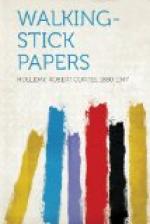He would read, for instance, that the pamphlet in his hand was the “Auditor’s Report of Receipts and Expenditures for the Financial Year Ending February 10, 1875, for the Town of Andover.” Where, he asked, with absolute certainty, was the town of Andover here referred to? He examined the printer’s imprint, which was explicit—personally: “Printed by Warren F. Draper, 1875.” There was something very friendly about this. Printers of public documents seem to be an amiable, neighbourly lot: “Printed at the Enterprise Office,” one mentions casually in a large, warm-hearted fashion. Another imprint reads, “Auburn, Printed by Charles Ferris, Daily Advertiser Office, 1848,” Mr. Ferris, in his lifetime, was evidently a very pleasant man, but a little careless of what to him, no doubt, were inessential details. He was thoughtless of the dark ignorance in places remote from Auburn of the Daily Advertiser. Another prominent Auburnian of the same craft, one W. S. Morse, it may be learned from some of the products of his press, flourished in 1886. But, the puzzled cataloguer inquires, was Mr. Morse successor to Mr. Ferris, or was he official printer to the Government of Auburn, Maine, far from the scene of Mr. Ferris’s public services, possibly in Auburn, New York? To these picayune points the breezy gentlemen make no reference.
The worker with public documents turns from the title pages to search the documents themselves. Are these the “Proceedings of the Board of Chosen Freeholders” of the City of Albany, Missouri, or of Albany, New Hampshire? (A cataloguer has a faint impression that there is an Albany, too, somewhere in the State of New York.) Is this a “Copy of Warrant for Annual Town Meeting” of Lancaster, Massachusetts, or New Hampshire, or Pennsylvania? Impossible, he thinks, that there should be no internal evidence.
He reads on and on. He notes the intimate nature of an Article 19: “To see if the town will accept a gift from Hannah E. Bigelow, with conditions.” He peruses “Selectman’s Accounts” of expenditures, how there was “Paid on account of Grammar School” such or such an amount; he learns the cost of “Hay Scales,” the expenses of “Fire Dep’t, Cemetery, Street Lamps.” He peers behind the official scenes at Decoration Day: monies paid out of the public treasury for “Brass Band, Address ($20.00), flowers, flags, tuning piano.” He goes over appropriations for “Repairs at Almshouse.” He sits with the “Trustees of Memorial Hall,” and informs himself concerning conditions at the “Lunatic Hospital.” He follows with feeling municipal accessions, “purchase of a Road-scraper, which we find a very useful machine, and probably money judiciously expended.” But more and more amazed at the circumstance as he continues he is left totally in the dark as to where he is all the while.




